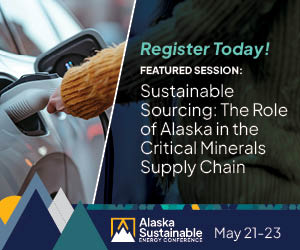Resources panel tackles 1872 mining law
U.S. senators, witnesses lean toward discarding House legislation in favor of a fresh start on updating 136-year-old rules
Last updated 2/24/2008 at Noon
The U.S. Senate Energy and Natural Resources Committee held a hearing Jan. 24 on legislation that the U.S. House of Representatives approved last year that would impose stiff new royalties on hardrock mining companies.
The full committee heard testimony on reform of the Mining Law of 1872 from a range of witnesses, primarily from western states, including Henri Bisson, deputy director of the Bureau of Land Management; and Randy Wanamaker, deputy mayor of Juneau and executive director of the BBC Human Resources Development Corp.
Representatives of Trout Unlimited, the National Mining Association, the Minerals Management Service and Taxpayers for Common Sense also testified.
The House in November passed the Hardrock Mining and Reclamation Act of 2007, which would update mining laws that have been in place since 1872 and slap hefty new royalties on gold, silver, copper and other minerals mined on public lands.
The House bill would impose the highest royalty rates in the world on hardrock mining operations and virtually halt any major U.S. expansions, according to the National Mining Association, and Alaska critics of the measure describe it as a "train wreck" waiting to happen.
Still, opponents of the bill in the Senate say they either will start over from scratch and draft a new reform bill or tone down the House version.
Critics of existing mining laws say any rewrite at all should be an improvement.
Panel hears support for industry
Sen. Pete Domenici, ranking Republican on the Energy and Natural Resources panel, told the committee Jan. 24 that he would like to throw out the house bill and start with a clean slate.
He said three issues should be a addressed in any reform of the 136-year-old law - replacing the old patent system with a more modern form of securing tenure on federal mining claims; developing a profits-based royalty system; and establishing an abandoned mine reclamation fund to clean up the numerous abandoned mine sites across the country that threaten the environment and public safety.
Sen. Lisa Murkowski, R-Alaska, told the committee that Alaska miners told her in December that they are very concerned about the House legislation.
Murkowski also stressed the economic importance of hardrock mining to the nation's security, noting that a dependence on foreign sources of key minerals makes the United States vulnerable in much the same way it is dependent on foreign oil.
Bisson echoed Murkowski's sentiments, observing that many of the creature comforts we enjoy derive from hardrock minerals. The mining industry makes possible a long list of innovations, from basics like toothpaste and cosmetics to increasingly sophisticated electronics such as computers and cell phones as well as a pharmacy of modern medicines, he said.
"We often take for granted minerals' contribution to our quality of life in this country," he told the Senate committee.
Bisson questioned the need for substantial mining reform, noting that the 1872 mining law is reinforced by numerous other federal regulations that ensure hardrock mining today occurs on public lands in an environmentally sound manner.
He said the Bush administration would like to see the mining law updated in a way that provides reasonable certainty for industry, while taking steps to protect the environment.
He also said BLM currently holds $1.1 billion in financial guarantees to support current federal requirements that operators reclaim and restore mining sites instead of abandoning them.
Mining good for Juneau
Wanamaker, a Tlingit Indian and registered geologist, told the committee that Juneau has a long history of successfully working with the mining industry.
He said hardrock mining is vital to communities like Juneau because it brings social and economic stability in the form of high-paying jobs and substantial tax revenue that provides opportunities for economic parity for members of minority groups.
He noted that Alaska's Tlingits currently have a 62 percent unemployment rate among adult males. Efforts to reverse this dismaying statistic are under way. These include Coeur Alaska Inc.'s Kensington Gold Mine Project near Juneau, which has yet to produce its first gold ore, but already is being hailed as the most successful affirmative action project in Alaska history, he said.
Wanamaker asked the Senate panel to provide for local governments working closely with other agencies and the mining sector in public-private partnerships that benefit communities where mines are located.
He also asked the senators to simplify, streamline and rationalize the mine permitting process to eliminate unnecessary appeals and litigation.












Reader Comments(0)